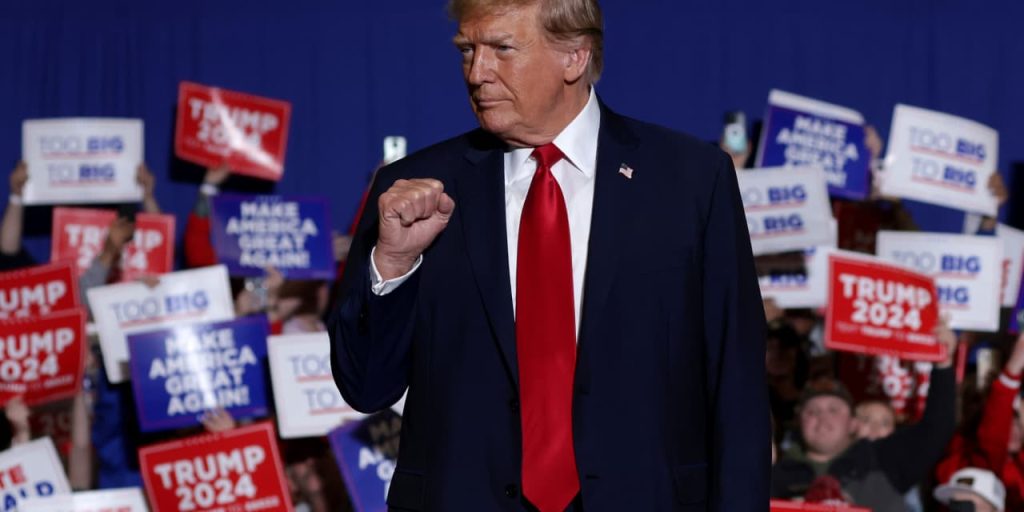This Super Tuesday, Donald Trump should lock up the Republican Party’s presidential nomination. And that might be bad news for the Magnificent Seven stocks—
Microsoft,
Meta Platforms,
Alphabet,
Amazon.com,
Nvidia,
Apple,
and
Tesla
—if he eventually becomes president.
At issue are Trump’s plans for tariffs on China. In February, the former president said he would put tariffs of 60% or more on imports of Chinese goods to the U.S., alongside a 10% blanket tariff on all imported goods, as part of his campaign to be selected as the Republican nominee. The China proposal would leave tariffs far higher than the current average U.S. levy on Chinese goods, which was raised to around 19% during Trump’s first term.
Not all of the Magnificent Seven are equally exposed to China. Apple and Tesla are the most highly dependent on the world’s second-largest economy for their supply chains. Between 90% and 95% of all of Apple’s products are produced in China, with
Foxconn
being the world’s largest manufacturer of iPhones. About 20% of electric car maker Tesla’s production comes from the country, according to GlobalData’s chief China economist Rory Green, although most of that is destined for the local market.
“Microsoft and Meta have the lowest exposure to Chinese goods,” says Green. “Microsoft also has the lowest share of revenue from China, followed by [Alphabet’s] Google.”
That would suggest a narrowing of the Magnificent Seven into a Fabulous Five. However, all large U.S. companies with multinational operations are likely to be exposed in some way. Many of Amazon’s third-party sellers import their goods from China, for example. The imposition of such tariffs could also increase competition and therefore prices for manufacturing capacity in countries outside of China such as Vietnam and India.
“Common risks across the Magnificent Seven should be a source of unease, write Ben Inker and John Pease. “They are all reliant on the general availability of semiconductors…four of them have ties to Foxconn, and their average revenue exposure to China and Taiwan is close to 20%.”
Meta and Amazon declined to comment on the potential impact of the tariffs, while Alphabet, Nvidia, Microsoft, Apple, and Tesla didn’t respond to requests for comment.
It’s important to note that it’s not clear how Trump’s tariffs would be implemented if he were elected and quantifying the scale of the tariffs is difficult. The Tax Foundation estimates the Trump administration’s original tariffs—which have largely continued under President Joe Biden—amounted to an $80 billion tax increase overall. The size of Trump’s new tariffs could make that look minuscule. The Tax Foundation estimated the 10% blanket tariff would act as a $300 billion annual tax increase on Americans. Separately, it projected the 60% or more tariff on Chinese goods would hike taxes by more than $200 billion.
The actual damage should be lower. Apple, for example, was granted a series of waivers to avoid a 15% tariff on its flagship products including the iPhone, iPad, and MacBook range in 2019. Meanwhile, U.S. companies have already reduced their dependence on China. U.S. imports from China decreased $109.1 billion to a total of $427.2 billion in 2023. For the first time in 17 years, China wasn’t the top source of imports as it ceded the top place to Mexico.
The Magnificent Seven companies have been among those diversifying supply chains away from China. Apple plans for around 25% of global iPhone production to be in India within the next two to three years, according to The Wall Street Journal. Alphabet’s Google also plans to start manufacturing Pixel smartphones in India this year. Such moves would likely be accelerated under Trump’s planned tariffs, with the associated expense of building additional factories and training the necessary workforce.
China would likely respond to new tariffs with their own retaliatory measures. Those could be particularly meaningful for chip maker Nvidia. “Faced with very high tariffs, China might escalate from its earlier strategy of proportionate, measured retaliation to tougher measures such as restrictions on exports of rare earth minerals that could have a much greater impact on U.S. businesses,” says Eswar Prasad, a professor at Cornell University.
Rare earths are used in chip making and electronics assembly, including smartphones and EV components such as magnets, making them especially important for Apple, Tesla, and Nvidia. China accounts for around 90% of their production, according to the Oxford Institute for Energy Studies, which says that Western countries are unlikely to be able to displace Chinese leadership until the end of the decade at the earliest.
The Magnificent Seven, of course, won’t be the only casualty if Trump wins and implements his tariff plan. The group stocks, though, now make up nearly a third of the entire value of the U.S. stock market, which means traders are exposed to a high level of risk concentrated within just a handful of companies.
Anything that could halt their momentum is a hazard for investors.
Write to Adam Clark at [email protected]
Read the full article here




